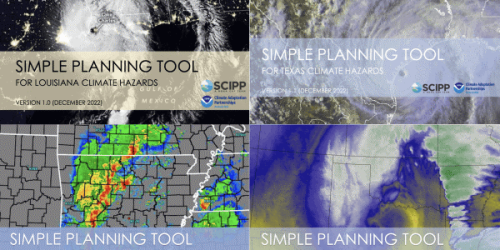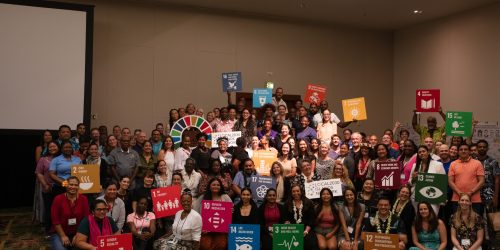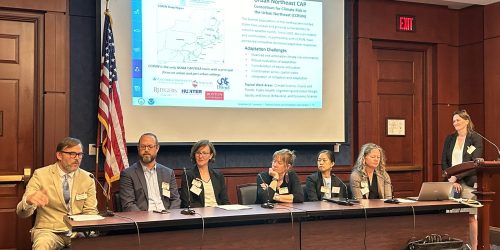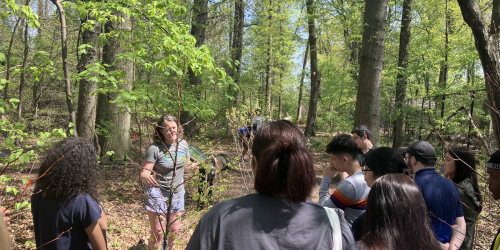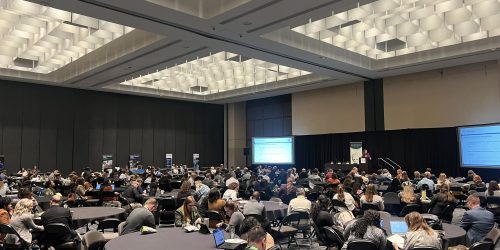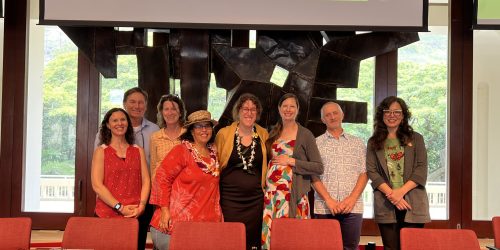The NOAA Climate Adaptation Partnerships program, formerly known as Regional Integrated Sciences and Assessments (RISA), is an applied research and community engagement program that expands society’s regional capacity to adapt to climate impacts in the United States.
“NOAA Climate Adaptation Partnerships (CAP) will continue RISA’s mission of supporting equitable adaptation action through sustained regional research, engagement, and capacity-building. The CAP program advances NOAA’s goal of creating an equitable climate ready nation by working closely with decision makers and frontline communities.”
– Wayne Higgins, Director, Climate Program Office
In 2022, Congress directed NOAA to change the name of the Regional Integrated Sciences and Assessments (RISA) program to “Climate Adaptation Partnerships (CAP).” This new name is fitting for the program as it exists today. “Climate” acknowledges the program’s focus on long-term change and variability. “Adaptation” encompasses approaches to reduce negative impacts of climate change and maximize emerging opportunities. “Partnerships” refers to the web of collaborative relationships between researchers and community decision makers within the regions. It also refers to the larger connections among regional teams that support the peer-to-peer learning that builds local capacity and expertise for national impact.

The CAP/RISA program supports sustained, collaborative research relationships that help communities build lasting and equitable climate resilience within the context of mainstream social and economic planning. Funded by 5-year cooperative agreements with NOAA, the work is accomplished by a network of teams led by research institutions, nonprofit organizations, and state/local/Tribal governments in multi-state regions. CAP/RISA experts engage in a variety of applied and co-developed research and engagement activities with communities. Additionally, teams collaborate with federal agency partners at the regional level and seek guidance from community-based organizations closest to communities. A central tenet of the CAP/RISA program is that climate adaptation and resilience is facilitated by and sustained across a wide range of experts, practitioners, and the public. Learning about and doing adaptation happens within social contexts. As such, the CAP/RISA program supports networks of people working together to plan for and adjust to change using science and local knowledge.
Expanding CAP/RISA’s National Impact
To achieve broader impact, the CAP/RISA program aims to reach robust nationwide coverage, enhance collaboration and networking to bring CAP/RISA impact to scale, and build the capacity of the next generation of researchers and professionals to tackle the climate challenge. CAP/RISA has recently undertaken activities to expand the program’s reach and impact to target new communities and new regions. Expansion activities have included:
- Extending CAP/RISA expertise & tools into the Southeast region (2020) where demand for these services has been identified. This includes the following projects:
- Promoting Effective Local Coastal Resilience Programs in South Florida
- Expanding Research and Engagement on Hazardous Extremes and Risk Assessments (HERA) Tool with Health Care Coalitions in the Southeast
- Cross-regional projects (2020-2022) to advance CAP/RISA network collaboration on 1) flood risk management in small-medium sized communities and/or; 2) building capacity for local/state hazard mitigation planning. This includes the following projects:
- Connecting Climate Adaptation and Hazard Mitigation Planning in Climate Discourse-Sensitive Regions: A Cross-RISA Collaborative Project
- Supporting Flood Planning in the Great Lakes and Intermountain West regions in the Context of Climate Change Impact, Future Growth, and Migration
- Co-Development of a Nationally Relevant Hazard Mitigation Planning Portal and Visualization Tool: A Partnership with MARISA, CISA, GLISA, and the Urban Sustainability Directors Network (USDN)
- Hazard Assessment and Resilience Building around Flood Risks in Small-Medium Sized Communities
- RISA/Headwaters Economics Working Group: Fiscal Policy for Advancing Climate Adaptation
- Business disruption and resilience projects (2020-2022) to build new knowledge of how small and medium businesses are impacted by and recover from complex disasters, which include COVID-19 and extreme climate and weather events. Projects include:
- 2 Pilot Projects in Charleston, SC (CISA), Beaumont & Port Arthur, TX (SCIPP)
- 1 Joint Post-Doctoral Fellow with the National Institute of Standards and Technology (NIST) supporting a national level, longitudinal survey “Complex Event Resilience of Small- and Medium-Sized Enterprises: Natural Disaster Planning During the COVID-19 Pandemic”
- 4 Team Projects
- Organizational Resilience to Compound Events: Identifying Key Capabilities for Small and Medium Sized Business Recovery under Wildfire and COVID-19 (CNAP)
- Building Resilience in Southern Arizona’s Local Food System (CLIMAS)
- Promoting Small Business Resilience in Coastal Communities in the New York- New Jersey Metropolitan Region (CCRUN)
- Understanding Repeat Disruption to Small, Minority-Owned, and Rural Businesses with Applications to Economic Diversification and Organizational Resilience in the Gulf Coast (SCIPP)
- Climate adaptation specialists (2021-2023), one each in both Puerto Rico and the U.S. Virgin Islands to help translate and integrate science into local planning, recovery, and resilience-building efforts.
- Renewed investment to CAP/RISA teams in 9 continuing regions with increased focus on frontline communities (2021-2025), including: Pacific Islands, Alaska, Pacific Northwest, Intermountain West, South Central, Great Lakes, Carolinas, Mid-Atlantic, and Urban Northeast. Regional teams focus on multiple climate and society issues and develop a set of interconnected projects that build the capacity of regional partners to act on those issues.
- Collaborative planning activities (2021-2023) to build key relationships across jurisdictional and institutional networks to help lay the groundwork for potential investment in the following regions:
- Southeast (Florida, Georgia, Alabama, Mississippi)
- Capturing Local Knowledge in the Southeastern United States
- The Heat + Affordable Housing Network: Exploring Landscapes of Thermal Inequity in the Southeastern U.S.
- A Justice, Equity, Diversity, and Inclusion Climate Alliance to Promote Health Equity and Build Resilience in the Southeast United States and Caribbean Regions
- U.S. Caribbean (Puerto Rico and the U.S. Virgin Islands)
- A Resilience Learning Agenda for Community-Based Organizations at the Intersection of Climate Hazards, Energy, Security, and Public Health in the U.S. Caribbean
- Appalachia (Ohio, West Virginia, Virginia, Kentucky, North Carolina, Tennessee)
- Building Resilience to Climate Change Driven Extreme Weather Events in Appalachia
- Upper Northeast (Maine, New Hampshire, Vermont, Massachusetts, New York)
- A Northeast Safe and Thriving for All (NEST)
- Collaborating Towards Increased Climate Resilience and Adaptation for Mobile Home Park Communities in Maine, New Hampshire, and Vermont
- Southeast (Florida, Georgia, Alabama, Mississippi)
- NEW: Launching a new CAP/RISA team (2022-2026) in the U.S. Caribbean (Puerto Rico and U.S. Virgin Islands). Regional teams focus on multiple climate and society issues and develop a set of interconnected projects that build the capacity of regional partners to act on those issues.
- NEW: Renewed investment for CAP/RISA teams in 2 continuing regions with increased focus on frontline communities (2022-2026). Regional teams focus on multiple climate and society issues and develop a set of interconnected projects that build the capacity of regional partners to act on those issues. Regions of investment include:
- West (California, Nevada)
- Southwest (Arizona, New Mexico)
A Network of Place-Based Experts for Communities
The core of the CAP/RISA program is the annually-supported network of 12 full regional teams conducting research and engagement, including development of decision-support services and tools, in partnership with local and regional decision makers in 28 states, 5 territories, and portions of 8 additional states. Additionally, special investments support the following initiatives through team funding:
- Sustained Assessment Specialists: In partnership with the CPO Assessment program, CAP/RISA supports early career specialists to work on regional climate assessment activities and to connect regional knowledge and networks with the congressionally-mandated and periodic National Climate Assessment.
- Small grant investments supporting underserved communities: Several regional teams were awarded additional funds to distribute small grants to their underserved community partners. This investment acknowledges that some community-based organizations are key partners with underserved communities, but need financial support and technical climate support (achieved by partnering with CAP/RISA teams) to facilitate climate outreach, engagement, and action.
Who are the teams?
Each regional team will retain their chosen name and acronym, which will be displayed on the CAP/RISA national map. Teams will add branding that reflects the program name transition. Because each team covers a specific U.S. region, it may also be referred to by its CAP/RISA region name. For example, the Western Water Assessment may be referred to as “a NOAA CAP/RISA team” or the “Intermountain West CAP/RISA team.” The full list of currently funded teams include:
- Alaska: Alaska Center for Climate Assessment and Policy (ACCAP)
Program Manager: Alison Hayden, abhayden@alaska.edu - Carolinas: Carolinas Collaborative on Climate, Health, and Equity(C3HE)
Program Manager: Shelly McComb, mmccomb@ncsu.edu - Great Lakes: Great Lakes Integrated Sciences and Assessments (GLISA)
Program Manager: Jenna Jorns, jljorns@umich.edu - Intermountain West: Western Water Assessment (WWA)
Program Manager: Benet Duncan, benet.duncan@colorado.edu - Mid-Atlantic: Mid-Atlantic Regional Integrated Sciences and Assessments (MARISA)
Program Manager: Krista Romita Grocholski, kristarg@rand.org - Pacific Islands: Pacific Regional Integrated Sciences and Assessments (Pacific RISA)
Program Manager: Gwendalyn Sisior, gsisior@asu.edu - Pacific Northwest: Northwest Climate Resilience Collaborative (NCRC)
Program Manager: Zack Thill, zthill@uw.edu - South Central: Southern Climate Impacts Planning Program (SCIPP)
Program Manager: Caylah Cruickshank, caylahc@ou.edu - Southwest: Climate Assessment for the Southwest (CLIMAS)
Program Manager: Gigi Owen, gigi@email.arizona.edu - Urban Northeast: Consortium on Climate Risk in the Urban Northeast (CCRUN)
Program Manager: Dan Bader, dab2145@columbia.edu - US Caribbean: Caribbean Climate Adaptation Network (CCAN) NEW
Lead Principal Investigator: Pablo Mendez Lazaro, Pablo.MendezLazaro@usda.gov - West: California-Nevada Applications Program (CNAP)
Program Manager: Julie Kalansky, jkalansky@ucsd.edu
Strategic Alignment
The CAP/RISA program contributes to several of NOAA’s Climate Ready Nation objectives, NOAA’s equity objective to support underserved and vulnerable communities, and is a covered program under the White House’s Justice40 Initiative.
For more information, visit cpo.noaa.gov/Divisions-Programs/Climate-and-Societal-Interactions/CAP-RISA.


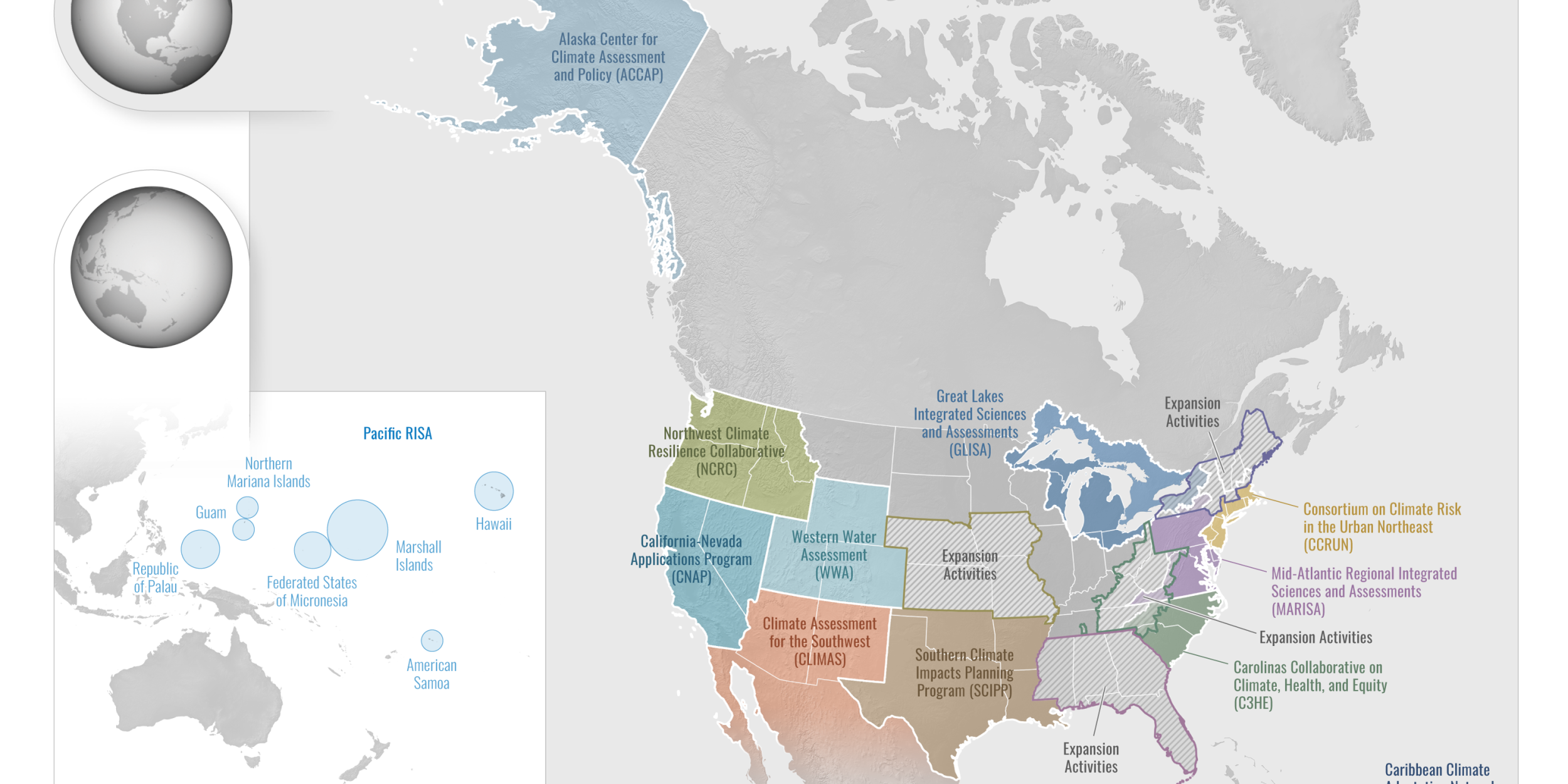

.png?ver=2022-09-23-163641-717)
